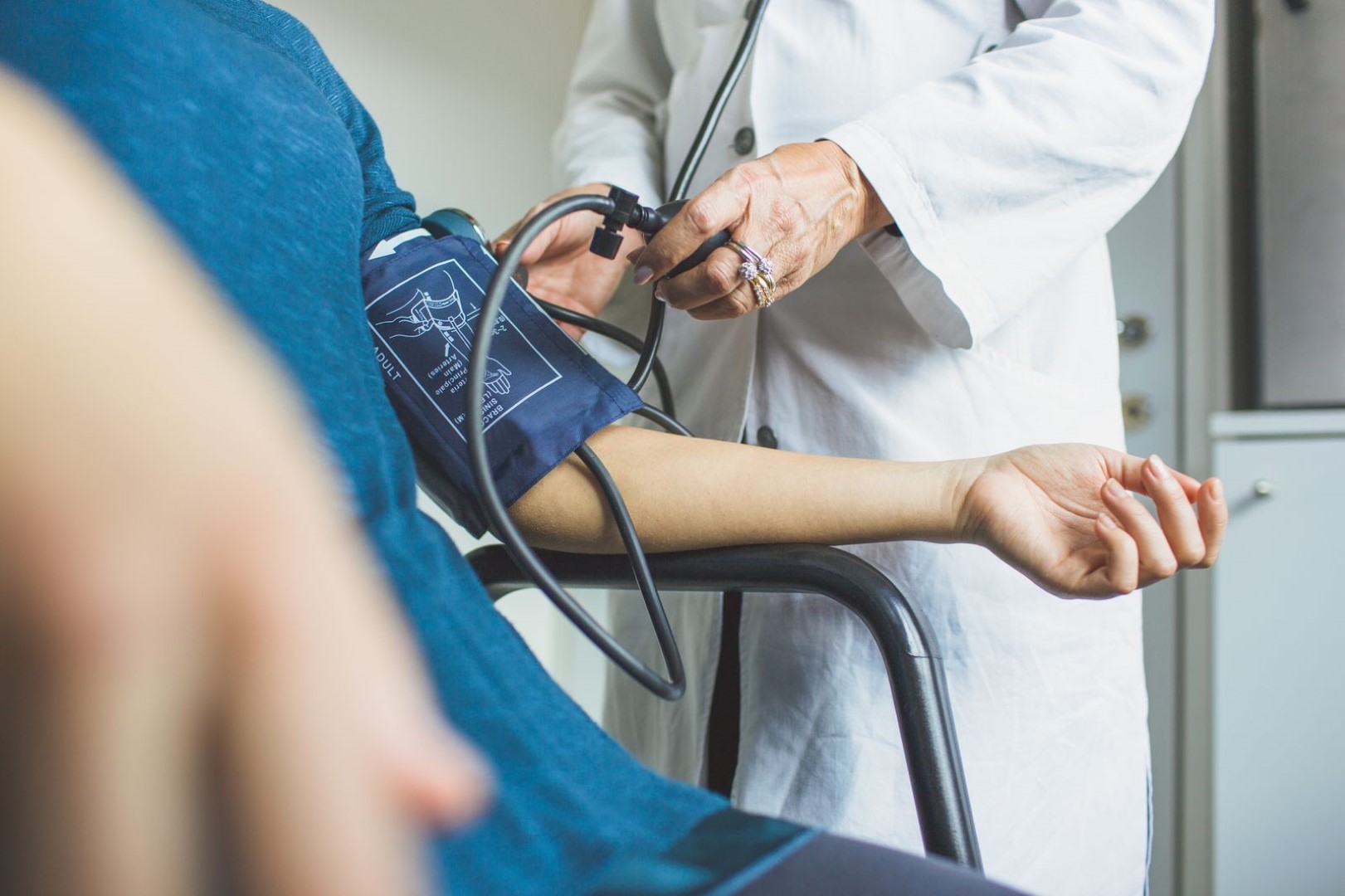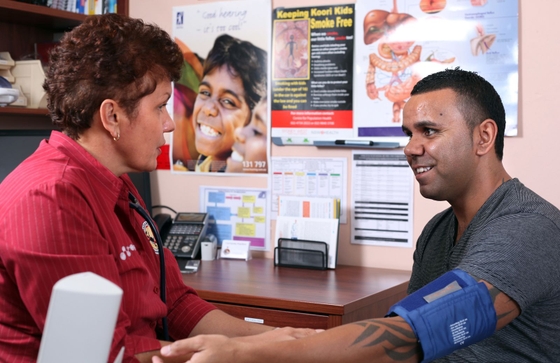
Blood pressure and your heart
Key takeaways
2 min read
- High blood pressure is a primary risk factor for heart disease
- High blood pressure can be silent, so it’s important to get regular blood pressure checks
- You can reduce your chances of having high blood pressure and keep it under control through diet and exercise
- In some cases, your doctor may prescribe medication to help lower high blood pressure.
Understand blood pressure and how it can impact your heart health
What is blood pressure?
Blood pressure is the pressure of your blood on the walls of your arteries as your heart pumps it around your body. Your blood pressure will go up and down naturally throughout the day depending on what you are doing, especially if you are doing exercise.
High blood pressure
What does it mean to have high blood pressure?
High blood pressure is when your blood pressure is permanently higher than normal. High blood pressure is one of the main risk factors for heart disease, especially heart attacks and strokes.
It’s possible to have high blood pressure without knowing, so it’s important to keep an eye on it by getting your heart health checked regularly by a health professional.
If you do have high blood pressure, you can help manage it with some simple changes to your lifestyle, such as eating a heart healthy diet and exercising more. Your doctor might also recommend some medications to keep it under control.
What causes high blood pressure?
There is no one specific cause of high blood pressure, but there are a number of things that can increase your chances of developing it, including:
- Family history
- Eating patterns (including salty foods)
- Alcohol intake
- Smoking
- Being overweight or obese
- Physical activity and exercise levels.
Your blood pressure can also go up temporarily due to stress, your emotional state, recent physical activity, caffeine consumption or even talking.
What are the signs and symptoms of high blood pressure?
There are no obvious signs or symptoms of high blood pressure, so you may not know you have it. That’s why it’s important to have regular check-ups to measure your blood pressure levels and learn how to manage it.
Why is high blood pressure bad for you?
There is a clear link between high blood pressure and an increased risk of heart disease, in particular having a heart attack or stroke.
Measuring blood pressure
How is blood pressure measured and diagnosed?
Your blood pressure is measured using a machine called a sphygmomanometer (commonly known as a blood pressure monitor). It will usually have an inflatable rubber cuff that goes around the top half of your arm and is connected to a measuring unit.
For manual sphygmomanometers, a small handheld air pump inflates the cuff. This is done by a machine for automated sphygmomanometers. Once it’s fully inflated, an air valve slowly releases the pressure in the cuff.
This creates a reading with two numbers that are written down with one number on top of the other e.g. 120/80 mm Hg.
- The top number is your systolic blood pressure (i.e. the amount of pressure in your arteries when your heart muscle contracts)
- The bottom number is your diastolic blood pressure (i.e. your blood pressure when your heart muscle is between beats).
What’s a healthy or ‘normal’ blood pressure reading?
Your doctor will tell you what your ideal blood pressure should be, based on your medical history.
A ‘normal’ blood pressure reading would be:
- Systolic blood pressure under 120 mm Hg
- Diastolic blood pressure under 80 mm Hg.
Download our handy blood pressure pocket guide to learn more about the three simple steps you can take to protect your heart.
Where can I get my blood pressure measured?
You can have your blood pressure measured by a doctor, a nurse, a pharmacist, or at home (using a validated blood pressure monitor).
How do I measure my blood pressure at home?
Your doctor will usually be the one to ask you to measure blood pressure at home. It’s important that you only use blood pressure monitors that have been tested for accuracy (validated). Australia doesn’t currently have a registry of validated blood pressure monitors. You can however find a list of validated blood pressure monitors on the British and Irish Hypertension Society website.
Download our printable resource for more helpful tips on how to measure your blood pressure at home. There is also a diary that you can use to record your daily blood pressure values and take to your next doctor’s appointment.
Before your reading
For the best results, you should:
- Use a cuff that fits the top half of your arm properly
- Take your measurements for seven days (minimum five) at around the same time in the morning or evening
- Do your reading before eating, taking medication or vigorous exercise
- Don’t smoke or drink caffeine for 30 minutes before your reading
- Don’t measure your blood pressure if you don’t feel comfortable or you are stressed or in pain.
How to take your reading
When you are ready to take your blood pressure reading, follow these steps:
- Sit quietly for five minutes, distraction-free
- Sit with both feet flat on the ground, with the top half of your arm bare and your back and arm supported
- Take two measures, one minute apart
- Record each measure in a paper diary or spreadsheet that you can take to your next doctor’s appointment.
How can you lower you high blood pressure?
Get regular blood pressure checks
Blood pressure isn’t usually something you can feel. If it’s too high, it needs to be treated. Schedule regular check-ups with your doctor to make sure you're keeping your blood pressure under control.
If you’re 18 or over, get your blood pressure checked at least every two years. If you are 45 and over, you should get your blood pressure checked as part of a regular, comprehensive Heart Health Check (HHC).
Lifestyle
The best way to look after your heart is with a healthy lifestyle.
Eat a heart-healthy diet
You can develop a ‘heart-healthy’ way of eating by enjoying a variety of nutritious foods on a regular basis. Eating a varied diet of healthy foods can help with your weight, blood pressure and cholesterol.
There are also specific changes you can make to your diet to help prevent heart disease:
- Eat less salt: Eating a diet high in salt can lead to higher blood pressure
- Replace unhealthy fats with healthy fats: Replacing saturated and trans fats with unsaturated fats can reduce your risk of heart disease.
To find out more about which food combinations work best together, have a look at our healthy eating principles.
Manage your blood cholesterol
Cholesterol is a fatty substance carried in your blood. Your body needs cholesterol to be healthy, but an imbalance of cholesterol in your blood can increase your risk of a heart attack or stroke.
Manage diabetes
It’s important to manage your diabetes to help prevent a heart attack or stroke.
Be physically active
Regular physical activity is great for your heart health. It’s never too late to start and get the benefits.
You should get 30 minutes of physical activity on most days of the week. It’s also important to sit less during your day and break up your sitting time.
Maintain a healthy weight
Maintaining a healthy weight can reduce the risk of heart disease and other health problems. Use tools like the body mass index and waist measurements to assess the recommended healthy weight for your body.
Be smoke-free
Not smoking cigarettes is one of the best things you can do to protect your heart.
Look after your mental health
We know that there can be a bigger risk of heart disease for people who have depression, are socially isolated or don’t have good social support. Having a good social life with family and friends can help.
Depression is more than feeling sad or low. If you feel depressed for more than two weeks, talk to your doctor, a family member or someone you know well.
Limit your alcohol intake
Drinking alcohol can raise your blood pressure. After a few drinks, your blood pressure will spike temporarily, and regular heavy drinking can lead to a long-term blood pressure increase.
Medication
Sometimes diet and exercise may not be enough to lower your blood pressure. In some cases, your doctor may recommend medication to help reduce your blood pressure and lower your risk of having a heart attack or stroke.
The most common blood pressure medicines include:
- ACE inhibitors
- Angiotensin receptor blockers
- Calcium channel blockers
- Beta blockers
- Diuretics.
Some people may need more than one medicine to bring their high blood pressure under control.
You might also be interested in...

Pressure to prioritise heart health for Australians unknowingly suffering with high blood pressure
A nationwide effort has found that almost 15 per cent had high blood pressure, placing them at an increased risk of heart disease over coming years.

Under pressure – what is blood pressure and why does it matter?
Almost half of all heart attacks are due to high blood pressure, and the only way to find out if you have high blood pressure is to have it checked regularly.

24-hour blood pressure monitoring
Blood pressure is the pressure of your blood on the walls of your arteries as your heart pumps it around your body. Your blood pressure will go up and down naturally throughout the day depending on what you are doing.
Last updated09 April 2025
Last reviewed13 June 2024